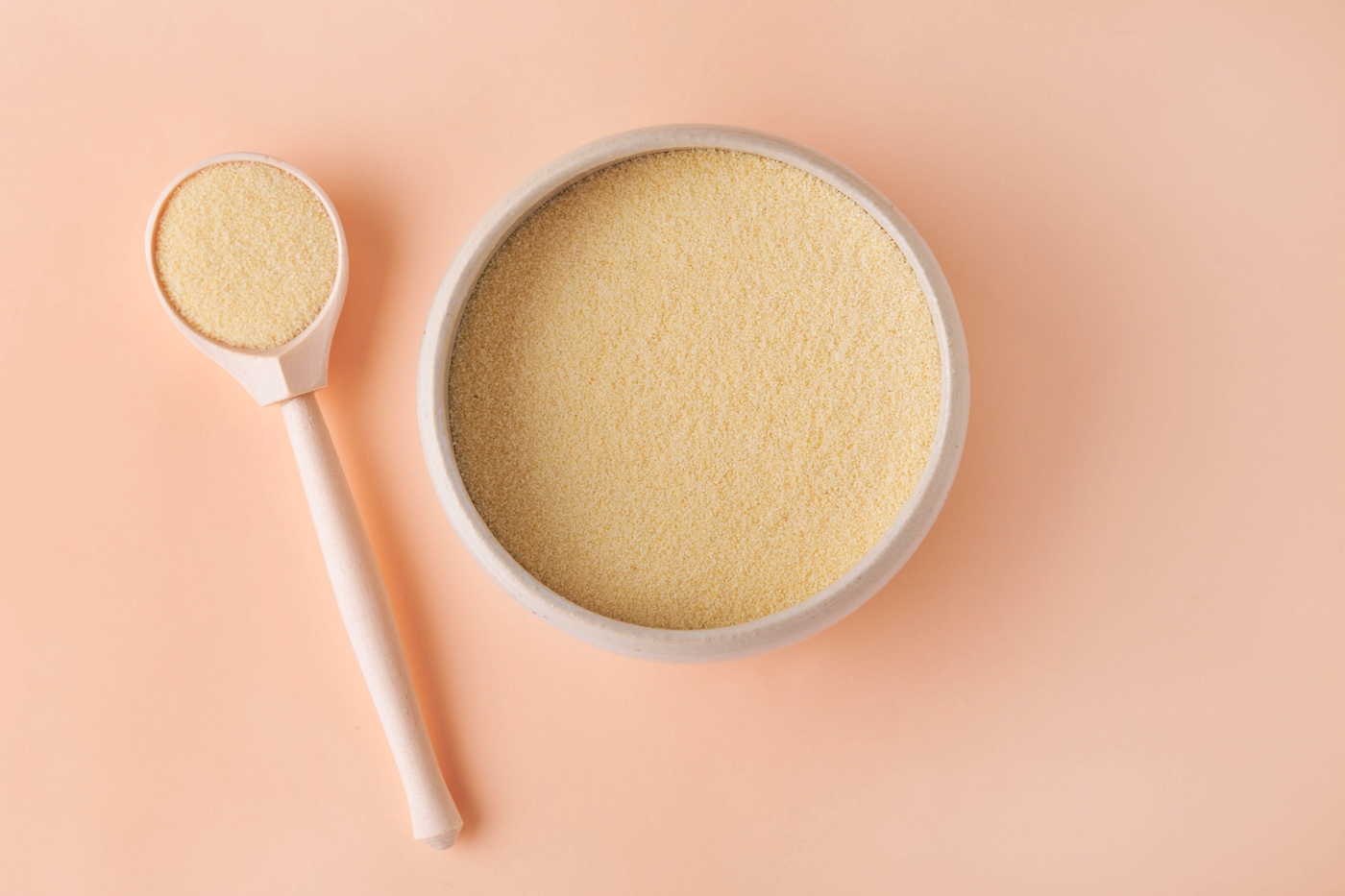Home>Misc>Featured>How Does L-Lysine Improve Athletic Performance


Featured
How Does L-Lysine Improve Athletic Performance
Published: October 11, 2023
Discover how L-Lysine, the featured ingredient, enhances athletic performance in this informative guide. Boost your game and surpass your limits with L-Lysine!
Introduction
Athletic performance is a crucial aspect for anyone involved in sports and fitness activities. Athletes continually seek ways to improve their performance, whether it’s through training techniques, nutrition, or supplements. One such supplement that has gained popularity in recent years is L-Lysine.
L-Lysine is an essential amino acid, meaning that it cannot be produced by the body and must be obtained through dietary sources or supplements. It plays a vital role in protein synthesis, collagen formation, and the production of enzymes and hormones. While L-Lysine is known for its importance in overall health, its potential benefits for athletic performance have drawn significant attention.
The role of L-Lysine in athletic performance is multi-faceted, with benefits ranging from improved muscle recovery to enhanced endurance and stamina. It has also been linked to increased nitric oxide production, which can have profound effects on physical performance. Furthermore, L-Lysine provides immune system support, ensuring that athletes maintain optimal health and reduce the risk of illness and injury.
It is worth noting that L-Lysine is not a magical solution that will instantly transform an athlete’s performance. Rather, it is a supplement that can support and enhance existing training and nutrition regimens. By understanding how L-Lysine works and incorporating it into a well-rounded approach to athletic performance, athletes can expect to see improvements in various aspects of their physical fitness.
In this article, we will explore the potential benefits of L-Lysine for athletic performance and delve into the science behind its effects. We will also discuss the recommended dosage for athletes and address any potential side effects. So, whether you are a professional athlete or a fitness enthusiast looking to take your performance to the next level, read on to discover how L-Lysine could be the missing piece in your athletic journey.
What is L-Lysine?
L-Lysine is one of the essential amino acids that the body needs for various biochemical processes. Amino acids are the building blocks of proteins, which are crucial for the growth, repair, and maintenance of tissues in the body. L-Lysine cannot be synthesized by the body, so it must be obtained through diet or supplements.
L-Lysine is involved in numerous physiological functions, including collagen synthesis, calcium absorption, and the production of enzymes and hormones. Collagen is a structural protein that supports the health and integrity of connective tissues, such as tendons, ligaments, and skin. By promoting collagen synthesis, L-Lysine can aid in the recovery and repair of damaged tissues, making it particularly beneficial for athletes.
In addition to its role in collagen synthesis, L-Lysine also plays a critical role in the production of carnitine, a compound involved in energy metabolism. Carnitine helps transport fatty acids into the mitochondria, where they are converted into energy. This process is essential for athletic performance, as it allows the body to efficiently utilize stored fat as a fuel source during exercise.
L-Lysine has also been found to have antiviral properties, particularly against the herpes simplex virus. It inhibits the replication of the virus and can help reduce the duration and severity of cold sores caused by the virus. While the antiviral effects of L-Lysine are not directly related to athletic performance, they can be beneficial for athletes who may experience recurring cold sores due to physical stress or weakened immune function.
Overall, L-Lysine is a vital nutrient that supports various functions in the body, including protein synthesis, collagen formation, energy metabolism, and immune system function. By ensuring an adequate intake of L-Lysine, athletes can support their body’s ability to recover from exercise-induced damage, optimize energy production, and maintain optimal immune function.
The Role of L-Lysine in Athletic Performance
When it comes to athletic performance, L-Lysine plays a crucial role in several aspects that can impact an athlete’s overall capabilities. Let’s explore the key ways in which L-Lysine can enhance athletic performance:
Improved Muscle Recovery: Intense physical exercise can lead to muscle damage and soreness. L-Lysine has been shown to aid in the repair and recovery of muscles. It supports protein synthesis, which is crucial for muscle growth and repair. By ensuring an adequate intake of L-Lysine, athletes can potentially reduce muscle soreness and promote faster recovery between workouts or competitions.
Enhanced Endurance and Stamina: Endurance and stamina are vital for athletes participating in endurance-based sports or activities. L-Lysine helps in the production of carnitine, a compound that plays a key role in energy metabolism by facilitating the transport of fatty acids into the mitochondria for fuel. By promoting efficient energy metabolism, L-Lysine can potentially enhance endurance and stamina, allowing athletes to perform at a higher level for longer durations.
L-Lysine and Nitric Oxide Production: Nitric oxide (NO) is a molecule that acts as a vasodilator, meaning it relaxes and widens blood vessels. This expansion allows for increased blood flow, oxygen delivery, and nutrient supply to working muscles. L-Lysine has been found to stimulate the release of NO, potentially improving blood flow and oxygenation to the muscles. This increased blood flow can result in improved endurance, reduced fatigue, and enhanced overall athletic performance.
L-Lysine for Immune System Support: Intense exercise can temporarily suppress the immune system, increasing the risk of illness and infections. L-Lysine has been shown to support immune function by enhancing the production of antibodies and promoting the activity of immune cells. By maintaining a robust immune system, athletes can reduce the risk of illness and maintain consistent training regimens, leading to improved performance.
By incorporating L-Lysine into their supplementation regimen, athletes can potentially benefit from improved muscle recovery, enhanced endurance and stamina, increased nitric oxide production, and strengthened immune function. However, it is important to note that L-Lysine is not a substitute for proper training, nutrition, and rest. It should be seen as a complementary tool to support an athlete’s overall performance and well-being.
Improved Muscle Recovery with L-Lysine
Intense physical exercise can result in muscle damage and inflammation, leading to delayed onset muscle soreness (DOMS). Efficient muscle recovery is crucial for athletes as it allows for optimal performance during subsequent workouts or competitions. L-Lysine can play a significant role in improving muscle recovery due to its involvement in protein synthesis and collagen formation.
Protein synthesis is the process by which the body builds new proteins, including those needed to repair and rebuild damaged muscle tissue. L-Lysine is an essential amino acid that is necessary for protein synthesis. By ensuring an adequate intake of L-Lysine, athletes can support the production of new proteins, facilitating the repair of damaged muscles and promoting faster recovery.
In addition to protein synthesis, L-Lysine also plays a vital role in collagen formation. Collagen is the most abundant protein in the body and is a critical component of tendons, ligaments, and other connective tissues. During intense exercise, these tissues can undergo stress and micro-tears, leading to muscle soreness and potential injuries.
By promoting collagen synthesis, L-Lysine helps in the repair of damaged connective tissues, enhancing overall muscle recovery. This is particularly beneficial for athletes participating in activities that require repetitive movements or high-impact exercises, such as running, weightlifting, or jumping.
Furthermore, L-Lysine has been found to have anti-inflammatory properties, which can further aid in muscle recovery. The inflammatory response that occurs after exercise is a natural process that helps initiate the healing and repair of damaged tissues. However, excessive inflammation can hinder the recovery process and contribute to prolonged muscle soreness.
Studies have shown that L-Lysine supplementation can reduce inflammation markers in the body, leading to improved recovery and reduced post-exercise muscle soreness. By modulating the inflammatory response, L-Lysine can help athletes bounce back faster and maintain a consistent training schedule.
It’s important to note that while L-Lysine can contribute to improved muscle recovery, it should not be relied upon as a sole means of recovery. Adequate rest, nutrition, and proper training techniques are equally crucial for optimal muscle recovery and overall performance enhancement.
Incorporating L-Lysine into a well-rounded supplementation regimen, in conjunction with proper training and recovery strategies, can significantly support athletes in achieving faster and more efficient muscle recovery. By reducing muscle soreness and promoting tissue repair, L-Lysine can help athletes perform at their best and reach their full potential.
Enhanced Endurance and Stamina
Endurance and stamina are vital for athletes participating in sports and activities that require prolonged physical exertion. Whether it’s a marathon, a long-distance bike ride, or a high-intensity interval training session, having the ability to sustain performance over an extended period is crucial. L-Lysine can play a role in enhancing endurance and stamina by supporting energy metabolism and optimizing the body’s ability to utilize fuel efficiently.
L-Lysine is involved in the production of carnitine, a compound that plays a critical role in energy metabolism. Carnitine is responsible for transporting fatty acids into the mitochondria, the powerhouse of the cell, where they are converted into usable energy. This process is particularly important during aerobic exercise or activities that require prolonged exertion.
By promoting efficient energy metabolism, L-Lysine ensures that the body can effectively utilize stored fat as a fuel source during exercise. This can lead to several benefits for endurance athletes. Firstly, by relying on fat as an energy source, athletes can conserve their limited glycogen stores, which are essential for high-intensity efforts. By delaying glycogen depletion, athletes can maintain performance for longer durations.
Secondly, using fat as a fuel source can aid in weight management for athletes aiming to optimize their power-to-weight ratio. By increasing fat oxidation and sparing glycogen, L-Lysine can potentially contribute to improved body composition and overall athletic performance.
Furthermore, L-Lysine has been shown to enhance oxygen utilization during exercise, another crucial factor for endurance performance. By improving oxygen delivery to the working muscles, L-Lysine can delay the onset of fatigue and allow athletes to sustain higher workloads for extended periods.
In addition to its effects on energy metabolism and oxygen utilization, L-Lysine may also play a role in reducing oxidative stress. Prolonged endurance exercise can generate excessive amounts of free radicals, leading to oxidative damage and impaired performance. L-Lysine, by virtue of its antioxidant properties, can potentially mitigate oxidative stress and protect against exercise-induced damage.
It’s important to note that while L-Lysine can contribute to enhanced endurance and stamina, it should be used in combination with a well-balanced nutrition plan and proper training techniques. Adequate carbohydrate intake, hydration, and periodized training programs tailored to specific endurance goals are equally essential for maximizing performance.
By incorporating L-Lysine into their supplementation strategy, athletes can potentially benefit from improved energy metabolism, enhanced oxygen utilization, and reduced oxidative stress. These effects can translate into increased endurance and stamina, allowing athletes to perform at their peak for longer durations and achieve their performance goals.
L-Lysine and Nitric Oxide Production
Nitric oxide (NO) is a molecule that plays a crucial role in vasodilation, the widening of blood vessels. This process allows for increased blood flow, oxygen delivery, and nutrient supply to working muscles. Nitric oxide is known to have profound effects on physical performance and is a sought-after physiological response for athletes. L-Lysine has been found to stimulate the production of nitric oxide in the body, making it potentially beneficial for enhancing athletic performance.
One of the ways L-Lysine promotes the production of nitric oxide is by increasing the availability of arginine, another amino acid involved in NO synthesis. Arginine is converted to nitric oxide through an enzymatic process, and L-Lysine has been shown to enhance this conversion by competing with arginine for the enzyme responsible for its breakdown.
Increased production of nitric oxide can have several benefits for athletes. Firstly, it leads to vasodilation, which means that blood vessels expand, allowing for improved blood flow to muscles. This can increase the delivery of oxygen and nutrients, enhancing endurance and reducing fatigue during physical exertion.
Furthermore, the increased blood flow resulting from nitric oxide production can improve the removal of metabolic waste products, such as lactate, from the muscles. This can delay the onset of fatigue and improve overall performance in high-intensity activities.
Another advantage of nitric oxide is its potential to enhance muscle pump and promote muscle growth. When blood vessels dilate, the increased blood flow causes muscles to appear larger and feel tighter. While this effect is temporary, it can contribute to increased motivation and perceived performance improvement.
Nitric oxide also plays a role in muscle protein synthesis, the process by which muscles repair and rebuild after exercise-induced damage. By promoting protein synthesis, L-Lysine, through its role in nitric oxide production, can potentially aid in muscle recovery and growth, further enhancing athletic performance.
It’s important to keep in mind that the effects of nitric oxide production can vary among individuals, and the response may depend on factors such as genetics, training status, and overall health. Additionally, the benefits of nitric oxide extend beyond athletic performance and may include cardiovascular health and overall well-being.
Regarding supplementation, L-arginine is often promoted as a primary nitric oxide booster, but L-Lysine’s ability to enhance arginine availability may offer an alternative strategy. However, additional research is needed to determine the exact mechanisms and optimal dosages for maximizing the effects of L-Lysine on nitric oxide production.
By incorporating L-Lysine into their supplementation regimen, athletes may potentially benefit from increased nitric oxide production. This can lead to improved blood flow, enhanced endurance, reduced fatigue, and potentially increased muscle growth and recovery. Nevertheless, individual responses may vary, and it is important to consult with a healthcare professional before adding any new supplements to your routine.
L-Lysine for Immune System Support
For athletes, maintaining a robust immune system is crucial not only for overall health but also for consistent training and optimal performance. Intense exercise can temporarily suppress the immune system, making athletes more susceptible to illness and infections. L-Lysine can play a role in supporting immune system function, ensuring that athletes stay healthy and able to perform at their best.
L-Lysine has been found to enhance immune function in several ways. Firstly, L-Lysine supports the production of antibodies, which are proteins produced by the immune system in response to foreign invaders, such as viruses and bacteria. Antibodies are crucial for the immune system’s ability to recognize and neutralize these invaders, preventing infection or illness.
In addition to antibody production, L-Lysine also promotes the activity of immune cells, such as lymphocytes and natural killer (NK) cells. These cells play a vital role in identifying and destroying infected or abnormal cells in the body. By enhancing the activity of immune cells, L-Lysine helps in the body’s defense against pathogens and supports a healthy immune response.
L-Lysine may also have specific antiviral effects, particularly against the herpes simplex virus (HSV). Studies have shown that L-Lysine can inhibit the replication of HSV and reduce the frequency and severity of cold sore outbreaks, which can be triggered by physical stress or weakened immune function. While the antiviral effects of L-Lysine are specific to HSV, they highlight its potential in supporting the body’s ability to fight against viral infections.
Furthermore, L-Lysine has been found to enhance the production of collagen, a protein that plays a critical role in maintaining the integrity of various tissues, including the skin and mucous membranes. The skin and mucous membranes act as physical barriers against pathogens, preventing their entry into the body. By supporting collagen production, L-Lysine contributes to the health and integrity of these barriers, enhancing their protective function.
It is important to note that while L-Lysine can support immune system function, it is not a cure for illnesses or a substitute for appropriate medical treatment. It should be seen as a complementary tool to help maintain optimal immune function and reduce the risk of illness or infection.
Incorporating L-Lysine into a well-rounded supplementation regimen, alongside a healthy diet, proper hydration, and sufficient rest, can help athletes bolster their immune system, reducing the risk of illness and supporting consistent training and performance. Athletes should consult with a healthcare professional to determine the appropriate dosage and ensure compatibility with their individual health needs.
Recommended Dosage of L-Lysine for Athletes
When it comes to determining the appropriate dosage of L-Lysine for athletes, several factors need to be taken into account, including age, body weight, training intensity, and individual needs. While there is no specific recommended daily allowance (RDA) for L-Lysine, some general guidelines can help athletes determine an effective and safe dosage.
For adults, a common starting dosage of L-Lysine for athletic purposes is around 1,000 to 3,000 milligrams (mg) per day, divided into two or three doses. This dosage range is generally considered safe and well-tolerated. Athletes with specific goals or needs, such as those looking to support muscle recovery or enhance immune function, may opt for higher dosages within this range.
It’s important to note that individual responses to L-Lysine may vary, and some athletes may find benefit from lower or higher dosages. Factors such as body weight, training volume, and personal tolerance should be considered, and it is advised to consult with a healthcare professional or a registered dietitian for personalized guidance.
L-Lysine is available in various forms, including capsules, tablets, powders, and liquids. Athletes can choose the form that suits their preferences and incorporate L-Lysine into their daily routine. It is recommended to take L-Lysine with meals to optimize absorption and minimize the risk of gastrointestinal discomfort.
When considering L-Lysine supplementation, it is important to note that L-Lysine is an essential amino acid, meaning it must be obtained through diet or supplements since the body cannot produce it. While L-Lysine is found in various food sources such as meat, fish, dairy products, and legumes, athletes with specific dietary restrictions or those who may struggle to meet their L-Lysine needs through diet alone may consider supplementation.
It is important to remember that supplements should not replace a well-rounded diet that includes a variety of nutrient-dense foods. A balanced approach to nutrition, including adequate protein intake, is key for overall health and athletic performance.
Athletes should always choose high-quality L-Lysine supplements from reputable brands to ensure product purity and safety. It is also advisable to follow the specific dosage instructions provided by the manufacturer and consult with a healthcare professional before starting any new dietary supplement.
By adhering to recommended dosages and incorporating L-Lysine into a comprehensive approach to athletic nutrition and supplementation, athletes can potentially experience the benefits of L-Lysine in supporting their training, recovery, and overall performance.
Potential Side Effects of L-Lysine
L-Lysine is generally considered safe for most individuals when taken within the recommended dosages. However, there are a few potential side effects that athletes should be aware of:
Gastrointestinal Issues: In some cases, high doses of L-Lysine can cause gastrointestinal discomfort, such as stomach pain, diarrhea, or nausea. To minimize these potential side effects, it is recommended to start with a lower dosage and gradually increase it if necessary. Taking L-Lysine with meals can also help improve digestion and reduce the risk of gastrointestinal issues.
Arginine Imbalance: L-Lysine and L-Arginine are two amino acids that compete for absorption and utilization in the body. High dosages of L-Lysine can potentially lead to a disruption in the balance between these two amino acids, which may have implications on arginine-related functions in the body. It is advised to maintain a balanced intake of both amino acids and consult with a healthcare professional to ensure appropriate dosages.
Allergic Reactions: While rare, some individuals may be allergic to L-Lysine or experience hypersensitivity reactions. Symptoms of an allergic reaction can include rash, itching, swelling, or difficulty breathing. If any allergic symptoms occur after taking L-Lysine, it is essential to discontinue use and seek medical attention immediately.
Interaction with Certain Medications: L-Lysine may interact with certain medications, such as antidiabetic drugs or medications that affect kidney function. If you are taking any medications or have underlying health conditions, it is crucial to consult with a healthcare professional before starting L-Lysine supplementation to ensure safety and avoid potential interactions.
It is important to note that the potential side effects of L-Lysine are relatively rare and typically occur with high doses or in individuals with specific sensitivities or conditions. By following the recommended dosages and seeking medical guidance, athletes can minimize the chances of experiencing any adverse effects.
If you experience any unexpected symptoms or side effects while taking L-Lysine, it is best to discontinue use and consult with a healthcare professional. They will be able to provide personalized advice and guidance based on your specific circumstances.
Overall, while L-Lysine is considered safe, it is advisable to exercise caution and be aware of potential side effects. Adhering to recommended dosages, maintaining a balanced diet, and seeking professional guidance can help athletes minimize risks and maximize the benefits of L-Lysine supplementation.
Conclusion
L-Lysine is an essential amino acid that plays a vital role in the body’s physiological processes. For athletes, L-Lysine holds great potential in enhancing athletic performance and supporting overall well-being. From improved muscle recovery to enhanced endurance and stamina, L-Lysine can offer a range of benefits for athletes seeking to optimize their performance.
The role of L-Lysine in muscle recovery is notable, as it supports protein synthesis and collagen formation, promoting faster healing and repair of damaged tissues. Enhanced endurance and stamina are also among the benefits of L-Lysine, as it supports energy metabolism and the utilization of stored fat as a fuel source during exercise, ultimately leading to improved performance.
L-Lysine’s ability to stimulate nitric oxide production holds promise for athletes, as it enhances blood flow, oxygenation, and nutrient delivery to the muscles, potentially leading to improved endurance, reduced fatigue, and increased muscle growth and recovery. Additionally, L-Lysine supports immune system function, ensuring athletes maintain optimal health and reduce the risk of illness and infections.
It is important for athletes to consider the recommended dosage of L-Lysine, starting with a conservative dosage and adjusting as needed. Consulting with a healthcare professional is advisable, especially for athletes with specific needs or medical conditions. Being aware of potential side effects is also crucial, although they are generally rare and can be minimized by following recommended dosages and seeking professional guidance.
Incorporating L-Lysine into an athlete’s overall lifestyle, which includes appropriate training techniques, proper nutrition, and sufficient rest, can lead to significant improvements in performance, recovery, and overall well-being. L-Lysine should be seen as a complementary tool rather than a standalone solution, working in conjunction with other aspects of training and nutrition to achieve optimal results.
Whether you are a professional athlete or a fitness enthusiast, understanding the potential benefits of L-Lysine and how it can support your athletic pursuits is key. So, go ahead and consider adding L-Lysine to your supplementation regimen, but always remember to prioritize a well-rounded approach to training, proper nutrition, and rest for optimal athletic performance and long-term health.








